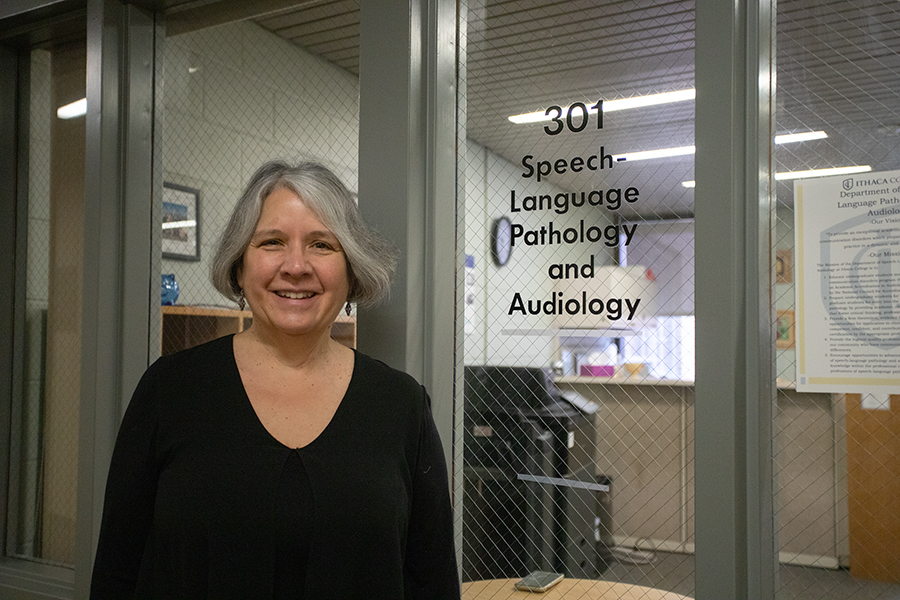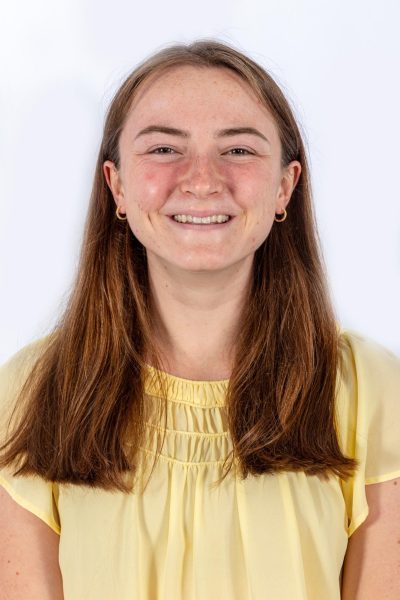Ithaca College is preparing to expand access to its speech-language pathology graduate program by offering an online, part-time master’s degree program starting in Fall 2024. The college offers an undergraduate degree in speech-language pathology and a master’s degree — with the option for teacher certification — in speech-language pathology.
Speech-language pathology is a medical field that focuses on preventing, evaluating, identifying and treating speech, language, cognitive communication, social communication and swallowing disorders in adults and children.
Lynne Hewitt, professor and chair of the Department of Speech-Language Pathology and Audiology, said there is a shortage of speech-language pathologists. According to the U.S. Bureau of Labor Statistics, while overall employment is expected to grow 3% from 2022 to 2032, employment for speech-language pathologists is projected to grow 19%.
Specifically, Hewitt said early intervention providers in Tompkins County have told the department that there is a long waiting list for speech services and a great need for more speech-language pathologists. Hewitt said the department wanted to help fill the need and provide an online path for nontraditional learners to become speech-language pathologists.
“Not everybody who would like to be a speech pathologist [or] change careers can go to a bricks-and-mortar program,” Hewitt said. “They already have a life … and they would love the opportunity to get started, but they just can’t just pull up stakes and go to an in-person program. So that’s what this program [is], the vision is to really reach people who could be fantastic clinicians, really provide those services that are so needed, but don’t have an opportunity.”
The in-person master’s degree program is full-time. There are five semesters of coursework, or six if students choose to complete a thesis, which must be completed within two years of starting the program.
The online master’s degree is part-time and takes eight semesters to complete if students enter with the necessary course prerequisites. Hewitt said students who have not met the prerequisites can take the courses at the college, which will add three semesters of coursework for a total of 11 semesters or 3.7 years.
“If we say, ‘Well, you have to get the prerequisites somewhere else,’ then that’s kind of turning them away, so we’re offering them their prerequisites,” Hewitt said.
Hewitt said the college is planning to accept 25 total students, between the leveling students who are completing prerequisites and students directly entering the program, for the first cohort of the online program.
Hewitt said she could see how some learners may be skeptical of an online program, especially following the virtual instruction that occurred at the start of the COVID-19 pandemic. She said the pandemic forced an emergency transition to online coursework, but the department is currently working with instructional designers to make a quality online program.
“We’re spending quite a lot of front-loaded time to make sure it’s ready to go and launch and not … like suddenly switching to Zoom in March 2020,” Hewitt said. “[The online program is] definitely the complete opposite of that — very, very carefully thought and very, very long tail in terms of putting the commitment to develop it.”
Students in the in-person program engage with the Sir Alexander Ewing-Ithaca College Speech and Hearing Clinic, which has therapy and diagnostic rooms, an assistive technology and alternative communication lab, an audiology sound suite and access to the most recent diagnostic and treatment resources.
The speech-language pathology master’s programs are accredited by the Council on Academic Accreditation of the American Speech-Language-Hearing Association, so both online and in-person students must have at least 400 hours of clinical experience to complete their degree.
Hewitt said online graduate students will not have access to the clinic, but they will still gain experience from simulations, most likely using the online software Simucase. Hewitt said both in-person and online Master’s degree candidates are required to complete two externships — clinical opportunities in settings like schools and hospitals for students to gain field experience — during their final semester.
Hewitt said the college plans to hire a fieldwork coordinator, who will work with students in the online program to find placements for externships.
Graduate student Cameryn Nichols is in her second semester of the speech-language pathology master’s program. She said she thinks the externship experiences for the online program will be very similar to the in-person program because students can choose where they complete their externships.
“A lot of people don’t stay in Ithaca,” Nichols said. “They either go home or go to different places that they might want to settle down in the future, so [the online program is] not super different in that sense. … We [in the in-person program] still have the contact information of our professors, just like we probably would with our online professors as well if we were in an online program. So I think that support system would still be there, it just wouldn’t be a face-to-face meeting.”
Nichols said she sees that there is not one straightforward path to becoming a speech-language pathologist.
“In the in-person program, there are some older people that didn’t just graduate undergrad [who are] seeking a new career path,” Nichols said. “If they had had that option for the flexible online option, maybe they would go for that. I’m not sure. But this first year in grad school definitely made me realize that there is not just one cookie-cutter student for graduate programs, and so I think that the flexibility is super important.”
Senior Molly Hankinson is in the speech-language pathology undergraduate program, and she said she plans to return to the college’s in-person program for her graduate degree.
Hankinson said she loves the professors in the Department of Speech-Language Pathology and Audiology, and she feels that they should be able to share their knowledge on a wider scope.
“We do have a really small campus, and it can be inaccessible for people who live at home and can’t leave home due to whatever reasons,” Hanksinon said. “So for the professors to still be able to share their knowledge and get their word out there, but people also still having the accessibility of it without having to come all the way up to Ithaca, New York, is pretty cool.”















